Supported by
Ministry of Environment and Forests (Government of India)
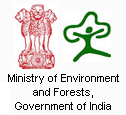
"The Ministry of Environment & Forests (MoEF) is the nodal agency in the Central Government for overseeing the implementation of India's environment and forest policies and programmes relating to conservation of the country's natural resources including lakes and rivers, its biodiversity, forests and wildlife, ensuring the welfare of animals and prevention and abatement of pollution.
While implementing these policies and programmes, the Ministry is guided by the principle of sustainable development. The broad objectives of the Ministry are:
- Conservation and survey of flora, fauna, forests and wildlife,
- Prevention and control of pollution,
- Afforestation and regeneration of degraded areas,
- Protection of the environment, and
- Ensuring the welfare of animals.
These objectives are well supported by a set of legislative and regulatory measures aimed at the preservation, conservation and protection of the environment. Besides the legislative measures, a National Conservation Strategy and Policy Statement on Environment and Development, 1992, National Forest Policy, 1988, a Policy Statement on Abatement of Pollution, 1992 and a National Environment Policy, 2006 also guide the Ministry's work.
The Ministry is also the nodal agency for the United Nations Environment Programme (UNEP), South Asia Co-operative Environment Programme (SACEP), International Centre for Integrated Mountain Development (ICIMOD) and the United Nations Conference on Sustainable Development (UNCSD) or Rio+20. The Ministry also coordinates with multilateral bodies such as Global Environment Facility (GEF) and regional bodies such as Economic and Social Council for Asia and Pacific (ESCAP) and South Asian Association for Regional Cooperation (SAARC) on matters pertaining to environment.
The Ministry successfully hosted the eleventh Conference of Parties to UN Convention on Biological Diversity (UNCBD) in October 2012 at Hyderabad, India. The Ministry is following the inter-governmental process of developing Sustainable Development Goals (SDGs), which is an outcome of Rio+20 summit held in June 2012 at Rio de Janeiro, undertaken by the Open Working Group (OWG) set up by UN General Assembly ."
Read more
Star Partner
The Norwegian Embassy
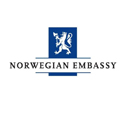
Cooperation between Norway and India is well established, dating back more than 5 decades. The two countries have moved from development cooperation to partnership in priority areas identified by the two countries.
Norway sees India as a crucial partner in efforts to address global environmental and development challenges, including the themes for DSDS 2014. Norway supports Indian efforts for energy security through hydropower investments, and trade in both the renewable and petroleum-based energy sectors. Bilateral projects financed by the Embassy address energy access through renewable technology, as well as climate change adaptation related to agriculture and water management. Programmes have a participatory approach involving farmers and affected communities.
Norway and India enjoy excellent bilateral relations based on a broad range of political and economic issues. Through the Embassy's programmes, Norway and India collaborate in diverse areas such as environment, energy, climate change, sustainable development, good governance, gender, higher education, science and technology, health, culture, business and trade. Norway is committed to strengthen, intensify, and further develop mutually beneficial cooperation with India through strategic use of its resources and expertise.
Read more
Premier Partner
The United Kingdom Government
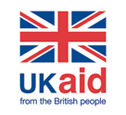
The Department for International Development (DFID) leads the UK's work to end extreme poverty. For several decades, DFID has been working with the Government of India to help India achieve its own poverty reduction priorities and the Millennium Development Goals.
In November 2012, the UK and India agreed to move to a new development relationship, ending the UK's financial grant aid to India. The UK will responsibly complete by 2015 all commitments to on-going projects. New programmes will focus on sharing skills and expertise in priority areas such as growth, trade and investment, skills and health, or on making investments in private sector projects which create opportunities for the poor while generating a return. We will also strengthen our partnership with India on global development issues like food security and climate change.
The Energy, Climate and Growth Unit (ECGU), housed in DFID's office in New Delhi, is a cross government unit with staff from the UK's Foreign and Commonwealth Office, Department for Energy and Climate Change and DFID. ECGU exists to enhance mutual prosperity between the UK and India through collaboration on energy security, and tackling dangerous climate change and its impacts.
For more information, please visit: https://www.gov.uk/government/world/organisations/dfid-india
Read more
Senior Partners
Swiss Agency for Development and Cooperation
Global Programme Climate Change India
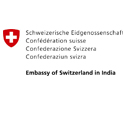
The Swiss Agency for Development and Cooperation (SDC) is Switzerland's international cooperation agency within the Federal Department of Foreign Affairs, and is responsible for the overall coordination of development cooperation activities and humanitarian aid of the Swiss Government. In India, SDC has been active since 1963.
The Global Programme Climate Change (GPCC) of SDC is represented in India through the Climate Change and Development (CCD) Division, Embassy of Switzerland, New Delhi. The cooperation under GPCC between India and Switzerland focuses on global public goods of climate change with emphasis on co-benefits of reduced emissions and development. The overall goal of SDC's engagement in India as part of its 2014-17 strategy is aimed at contributing to climate compatible development over the long-term and supports the necessary adaptation and low-carbon development measures.
The main programmatic focus of the Swiss cooperation in India are:
- Adaptation: supporting climate resilient development through adapting to climate change impacts (‘managing the unavoidable')
- Energy: supporting low-carbon paths to development (‘avoiding the unmanageable')
Within its programmatic focus, SDC engages on enabling adaptation and low carbon development actions; knowledge, science and research; and evidence based policy framework.
In addition, the India office also houses cooperation programmes on Local Governance Initiative (LoGIN), South Asia Hub; Swiss Humanitarian Aid Unit (SHA); and State Secretariat for Economic Affairs (SECO).
http://www.swiss-cooperation.admin.ch/india/
Read more
Asian Development Bank
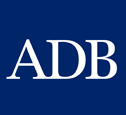
ADB's vision is an Asia and Pacific region free of poverty. Its mission is to help its developing member countries reduce poverty and improve the quality of life of their people.
Despite the region's many successes, it remains home to two-thirds of the world's poor: 1.7 billion people who live on less than $2 a day, with 828 million struggling on less than $1.25 a day. ADB is committed to reducing poverty through inclusive economic growth, environmentally sustainable growth, and regional integration. Based in Manila, ADB is owned by 67 members, including 48 from the region. Its main instruments for helping its developing member countries are policy dialogue, loans, equity investments, guarantees, grants, and technical assistance.
Read more
Co-Associate Partners
Agence Française de Dèveloppement (AFD)
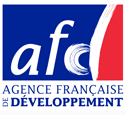
The Agence Française de Dèveloppement (AFD) is a public development finance institution that has been working to fight poverty and foster economic growth in developing countries and the French Overseas Provinces for seventy years. It executes the policy defined by the French Government.
AFD is present on four continents where it has an international network of seventy agencies and representation offices, including nine in the French Overseas Provinces and one in Brussels. It finances and supports projects that improve people's living conditions, promote economic growth and protect the planet, such as schooling for children, maternal health, support for farmers and small businesses, water supply, tropical forest preservation, and the fight against climate change.
In 2012, AFD approved €7 billion to finance activities in developing countries and the France's overseas provinces. The funds will help get 10 million children into primary school and 3 million into secondary school; they will also improve drinking water supply for 1.79 million people. Energy efficiency projects financed by AFD in 2012 will save nearly 3.6 million tons of carbon dioxide emissions annually.
Read more
United Nations Development Programme
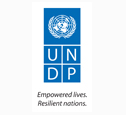
The United Nations Development Programme (UNDP) helps empower lives and build resilient nations. UNDP partners globally with all levels of society in more than 177 countries and territories where we operate. We offer global perspective and local insight to help empower lives and build resilient nations that can withstand crisis, and that drive and sustain growth that improves the quality of life for everyone. We call this people-centred approach “human development”.
World Bank
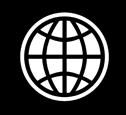
The World Bank Group encompasses five closely associated development institutions: the International Bank for Reconstruction and Development (IBRD), the International Development Association (IDA), the International Finance Corporation (IFC), the Multilateral Investment Guarantee Agency (MIGA), and the International Centre for Settlement of Investment Disputes (ICSID).
The World Bank, which came into existence in July 1944, is made up of two unique development institutions owned by 187 member countries—the International Bank for Reconstruction and Development (IBRD) and the International Development Association (IDA). It is a vital source of financial and technical assistance to developing countries around the world. Each institution plays a different, but supportive role in the Bank mission of global poverty reduction and the improvement of living standards. The IBRD focuses on middle income and creditworthy poor countries, while IDA focuses on the poorest countries in the world. Together, they provide low-interest loans, interest-free credit, and grants to developing countries for education, health, infrastructure, communications, and many other purposes.
During fiscal year 2011 (July 2010 to June 2011), the total World Bank lending amounted to US$42 billion, comprising about US$26 billion in IBRD lending and US$26 billion in IDA support.
Read more
Thematic Track Partners
Agence Française de Dèveloppement (AFD)

The Agence Française de Dèveloppement (AFD) is a public development finance institution that has been working to fight poverty and foster economic growth in developing countries and the French Overseas Provinces for seventy years. It executes the policy defined by the French Government.
AFD is present on four continents where it has an international network of seventy agencies and representation offices, including nine in the French Overseas Provinces and one in Brussels. It finances and supports projects that improve people's living conditions, promote economic growth and protect the planet, such as schooling for children, maternal health, support for farmers and small businesses, water supply, tropical forest preservation, and the fight against climate change.
In 2012, AFD approved €7 billion to finance activities in developing countries and the France's overseas provinces. The funds will help get 10 million children into primary school and 3 million into secondary school; they will also improve drinking water supply for 1.79 million people. Energy efficiency projects financed by AFD in 2012 will save nearly 3.6 million tons of carbon dioxide emissions annually.
Read more
Asian Development Bank

ADB's vision is an Asia and Pacific region free of poverty. Its mission is to help its developing member countries reduce poverty and improve the quality of life of their people.
Despite the region's many successes, it remains home to two-thirds of the world's poor: 1.7 billion people who live on less than $2 a day, with 828 million struggling on less than $1.25 a day. ADB is committed to reducing poverty through inclusive economic growth, environmentally sustainable growth, and regional integration. Based in Manila, ADB is owned by 67 members, including 48 from the region. Its main instruments for helping its developing member countries are policy dialogue, loans, equity investments, guarantees, grants, and technical assistance.
Read more
Climate & Development Knowledge Network (CDKN)
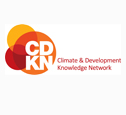
Our Mission
The Climate and Development Knowledge Network (CDKN) supports decision makers in designing and delivering climate compatible development
We do this by combining research, advisory services and knowledge sharing in support of locally owned and managed policy processes. We work in partnership with decision makers in the public, private and non-governmental sectors nationally, regionally and globally.
About CDKN
CDKN is managed by an alliance of six organisations that brings together a wide range of expertise and experience: PricewaterhouseCoopers (PwC), the Overseas Development Institute (ODI), Fundación Futuro Latinoamericano, SouthSouthNorth, LEAD (International and Pakistan) and INTRAC.
Many of CDKN's services are provided by collaborating organisations and individuals from around the globe. We source the best expertise wherever it is found, helping to build capacity where needed, and fostering long-term collaborative relationships.
Find out more on our website and sign up for our monthly e-newsletter. www.cdkn.org enquiries@cdkn.org
Read more
The Institute for Global Environmental Strategies (IGES)
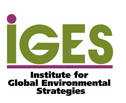
The Institute for Global Environmental Strategies (IGES) was established in March 1998 under an initiative of the Japanese government and with the support of Kanagawa Prefecture based on the “Charter for the Establishment of the Institute for Global Environmental Strategies”.
The aim of the Institute is to achieve a new paradigm for civilization and conduct innovative policy development and strategic research for environmental measures, reflecting the results of research into political decisions for realising sustainable development both in the Asia-Pacific region and globally. IGES made the transition to a Public Interest Incorporated Foundation in April 2012.
According to the Charter for the Establishment of the IGES, the Institute will tackle fundamental challenges to human society, which exists thanks to the bounty of the global environment, and to redefine the values and value systems of our present societies that have resulted in the global environmental crisis, in order to create new ways of conducting activities and a new paradigm for civilization.
By recognising these crucial issues, IGES will promote research cooperation with international organisations, governments, local governments, research institutions, business sectors, non-governmental organisations (NGO) and citizens.
Read more
Keio University
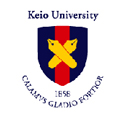
Keio has a proud history as Japan's very first private institution of higher learning, which dates back to the formation of a school for Dutch studies in 1858 in Edo, present-day Tokyo, by founder Yukichi Fukuzawa. Since the school's inception, the students of Keio have risen to the forefront of innovation in every imaginable academic field, emerging as social and economic leaders.
Keio has a proud history as Japan's very first private institution of higher learning, which dates back to the formation of a school for Dutch studies in 1858 in Edo, present-day Tokyo, by founder Yukichi Fukuzawa. Since the school's inception, the students of Keio have risen to the forefront of innovation in every imaginable academic field, emerging as social and economic leaders.
In today's internationally interdependent world, Keio places great effort upon maintaining the finest teaching faculty and the highest standard of research and scholarship. Based on the knowledge and experience of their predecessors, today's Keio students strive to develop the leadership qualities that will enable them to make valuable contributions to tomorrow's society.
The most important feature of Keio is the emphasis on developing practical knowledge. Keio University opened its fifth university campus in Shonan Fujisawa (SFC) in 1990. Its mission from the beginning was to offer education and research in a real multi-disciplinary setting with an emphasis on practical output. Building on that base, this future-oriented campus seeks to make the best use of highly advanced information technology as its infrastructure for training students in a broad spectrum of academic fields. SFC gives the students' own research topics the highest priority, and they will form the core of their academic study. This is practiced according to an educational practice called “project-based learning,” which is used both at undergraduate and graduate levels.
Keio University is not merely a place for academic pursuit. Its mission is to be a constant source of honorable character and a paragon of intellect and morals for the entire nation and for each member to apply this spirit to elucidate the essence of family, society, and nation. They will not only articulate this essence in words, but also demonstrate it in their actions, and by so doing make Keio a leader of society.
Read more
Swiss Agency for Development and Cooperation
Global Programme Climate Change India

The Swiss Agency for Development and Cooperation (SDC) is Switzerland's international cooperation agency within the Federal Department of Foreign Affairs, and is responsible for the overall coordination of development cooperation activities and humanitarian aid of the Swiss Government. In India, SDC has been active since 1963.
The Global Programme Climate Change (GPCC) of SDC is represented in India through the Climate Change and Development (CCD) Division, Embassy of Switzerland, New Delhi. The cooperation under GPCC between India and Switzerland focuses on global public goods of climate change with emphasis on co-benefits of reduced emissions and development. The overall goal of SDC's engagement in India as part of its 2014-17 strategy is aimed at contributing to climate compatible development over the long-term and supports the necessary adaptation and low-carbon development measures.
The main programmatic focus of the Swiss cooperation in India are:
- Adaptation: supporting climate resilient development through adapting to climate change impacts (‘managing the unavoidable')
- Energy: supporting low-carbon paths to development (‘avoiding the unmanageable')
Within its programmatic focus, SDC engages on enabling adaptation and low carbon development actions; knowledge, science and research; and evidence based policy framework.
In addition, the India office also houses cooperation programmes on Local Governance Initiative (LoGIN), South Asia Hub; Swiss Humanitarian Aid Unit (SHA); and State Secretariat for Economic Affairs (SECO).
http://www.swiss-cooperation.admin.ch/india/
Read more
START
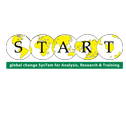
Our Mission
To increase opportunities for research, education and training that strengthen scientific capacities in developing countries to understand, communicate and motivate action on critical global environmental change challenges.
About START
START promotes research-driven capacity building to advance knowledge on global environmental change in Africa and Asia-Pacific. We accomplish this through research grants and fellowships, knowledge assessments and syntheses, curricula development, advanced training institutes, multi-stakeholder dialogues, and place-based strategic planning. Our work focuses on climate variability and change, disaster risk reduction, land-use/land-cover change, biodiversity conservation, urban development, human health, water resources management, agriculture and food security, and regional climate modeling and climate services. START's actions target science, as well as the interface of science, policy and practice, and inform actions toward fostering more resilient and adaptable development.
Find out more on our website, www.START.org
Read more
The United Kingdom Government

The Department for International Development (DFID) leads the UK's work to end extreme poverty. For several decades, DFID has been working with the Government of India to help India achieve its own poverty reduction priorities and the Millennium Development Goals.
In November 2012, the UK and India agreed to move to a new development relationship, ending the UK's financial grant aid to India. The UK will responsibly complete by 2015 all commitments to on-going projects. New programmes will focus on sharing skills and expertise in priority areas such as growth, trade and investment, skills and health, or on making investments in private sector projects which create opportunities for the poor while generating a return. We will also strengthen our partnership with India on global development issues like food security and climate change.
The Energy, Climate and Growth Unit (ECGU), housed in DFID's office in New Delhi, is a cross government unit with staff from the UK's Foreign and Commonwealth Office, Department for Energy and Climate Change and DFID. ECGU exists to enhance mutual prosperity between the UK and India through collaboration on energy security, and tackling dangerous climate change and its impacts.
For more information, please visit: https://www.gov.uk/government/world/organisations/dfid-india
Read more
United Nations Development Programme

The United Nations Development Programme (UNDP) helps empower lives and build resilient nations. UNDP partners globally with all levels of society in more than 177 countries and territories where we operate. We offer global perspective and local insight to help empower lives and build resilient nations that can withstand crisis, and that drive and sustain growth that improves the quality of life for everyone. We call this people-centred approach “human development”.
Media Partners
CNN-IBN

CNN-IBN is India's No.1 English news channel and is one of the most respected and trusted sources for news and information in the country today. The country's most credible face in news television Padma Shri Rajdeep Sardesai, with a team of renowned journalists and the support of cutting edge broadcast technology makes CNN-IBN one of the most robust teams of news professionals.
The channel has been a ‘thought leader' and pioneered several path-breaking initiatives that include CNN-IBN Indian of the Year, Real Heroes, the Citizen Journalist Awards, Young Indian Leaders, India Positive Awards, and State of the Nation Poll to name a few.
Since inception in 2005, CNN-IBN has been reaching out to an average of 23 million viewers and 45 million households every day. The channel has also received more than 185 awards; making it India's most awarded English News Channel.
Read more
The Week

The Week was launched in December 1982 and is today the largest selling general-interest English newsmagazine, as certified by the Audit Bureau of Circulations. The Week believes in Journalism with A Human Touch. The magazine has always tried to understand readers' taste and preferences and has undergone changes as it reached different milestones in its growth. Its latest look was given by one of the world's best known names in newspaper and magazine design, MarioGarcia.
Over the years, The Week's writers have won the highest awards, including the Ramnath Goenka Foundation's excellence in journalism award, The Statesman Rural Reporting Award, IPI-India Award for Excellence in Journalism, Union Catholique Internationale de la Presse's triennial international award, Gold Award for Magazine Cover Design from the World Association of Newspapers-IFRA. It has also won the inaugural Christiane Amanpour Award for Religion Journalism by Washington-based International Center for Journalists. One of the highlights of the newsmagazine is its annual Man of the Year cover story. The Week's first Man of the Year, Baba Amte, went on to win the Ramon Magsaysay Award, as did 'water man' Rajendra Singh.
Read more
Sci Dev Network
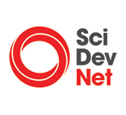
SciDev.Net is the world's leading destination for cutting-edge news and thoughtful analysis on science, technology and global development. A network of global writers, and offices around the world ensure useful, relevant and accessible reporting. Readers rely on SciDev. Net's content to bring scientific insight and technological innovation to the goal of equitable sustainable development
OneWorld South Asia
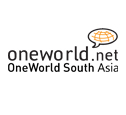
OneWorld South Asia http://southasia.oneworld.net/ is a one-stop information source on social and sustainable development content.
Working collaboratively with partners, the regional edition of the OneWorld International network generates and disseminates news and features to its network websites, development organisations and mainstream media through real-time RSS feeds. OneWorld also undertakes development event management and outreach to mainstream and social media. Besides, OneWorld has instituted a couple of media fellowships.
OneWorld partners range from national and state governments, UN organisations, corporates, and multilateral and bilateral organisations to international NGOs.
Adding to the body of work by media persons, the researchers at OneWorld undertake research and documentation of good practices on Agriculture, Climate Change, Disaster Management, Environmental Sustainability, Health, ICT for Development, Livelihood, Rural Development, Urban Development, Water and Sanitation etc. For more visit, Governance Knowledge Centre http://indiagovernance.gov.in
OneWorld also broadcasts a weekly programme on AIR FM Rainbow on development issues. It is offered to more than 100 community radio stations for further relaying. For more visit, Ek Duniya Ek Awaaz http://edaa.in/ OneWorld is also managing the Community Radio Facilitation Centre http://crfc.in/ at the Union Ministry of information & Broadcasting.
Besides, OneWorld is also active on social media like Facebook, Twitter and YouTube.
Read more


























